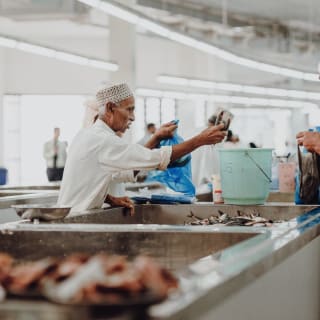
Communication in Oman
Language Skills and Cultural Sensitivity
Language Skills and Cultural Sensitivity
In Oman, a blend of basic language skills and cultural sensitivity can unlock more profound travel experiences. While Arabic is the official language, English facilitates communication in many areas. Often, though, it’s the simple Arabic phrases that bring smiles to Omanis and enhance encounters. This guide demonstrates how apps, phrasebooks, and an awareness of local customs can help travelers connect authentically with the country and its people.
Introduction to Communication in Oman
Connecting with others in Oman offers travelers the chance to dive deeper into the country’s fascinating culture and experience unique interactions. Although Arabic is the official language, English is widely spoken, especially in tourist areas like Muscat, Sur, and Sohar. Using even a few Arabic expressions can open many doors, as Omanis appreciate visitors who make an effort to speak their language. Greetings like “as-salam alaykum” (hello) or a simple “shukran” (thank you) are not only polite but also show respect and appreciation for Omani culture.
Cultural sensitivity also plays a key role in successful interactions in Oman. This Islamic country values traditional customs and respect for local manners. Beyond language, appropriate dress and respectful behavior are essential to avoid misunderstandings and create authentic experiences. Patience and openness, especially when invited to share tea or coffee, are part of the valued customs that allow travelers to experience Omani hospitality up close.
With basic language skills and cultural awareness, travelers gain a deeper level of experience, fully embracing Oman’s warm and welcoming spirit. Oman becomes more than just a stunning landscape; it’s a place for meaningful encounters and unforgettable impressions.
Essential Arabic Phrases for Travelers
While English is widely spoken in many parts of Oman, Omanis especially appreciate travelers who make even a small effort to use Arabic. Simple greetings and courtesies not only prove useful but also show respect and interest in the culture, often leading to warm interactions.
Key Greetings and Courtesies
The most common greeting in Oman is “As-salamu alaykum” (Peace be upon you), a traditional Islamic phrase typically answered with “Wa alaykum as-salam” (And peace be upon you). This gesture not only expresses respect but also establishes a friendly basis for conversation. Other useful greetings include “Marhaban” (Hello/Welcome), “Sabah al-kheir” (Good morning), and “Masaa al-kheir” (Good evening).
Asking “Kaif halak?” (How are you?) shows genuine interest and is typically answered with “Alhamdulillah” (Thanks be to God, I am well). Important polite phrases like “Min fadlak” (Please, to a man) and “Shukran” (Thank you) or “Afwan” (You’re welcome) are essential in daily situations and often lead to friendly, open conversations.
Practical Phrases for Everyday Situations
For travelers exploring independently, shopping, or trying Omani cuisine, some useful phrases can simplify daily life. In a taxi or when navigating, one might ask, “Ayna…?” (Where is…?) or “Kaifa asal ila…?” (How do I get to…?). Specific questions such as “Ayna al-matar?” (Where is the airport?) or “Hal hunak mahatat al-otobees?” (Is there a bus stop here?) can help when seeking directions.
In souks or shops, phrases like “Bikam hatha?” (How much is this?) and “Hal yuwjad tawfiqat?” (Are there discounts?) show a friendly approach to inquiring about prices. When dining or experiencing local cuisine, phrases like “Tawila li ithnayn, min fadlik” (A table for two, please) or “Al-hisab, min fadlik” (The bill, please) are helpful. These simple expressions ease communication, create a pleasant atmosphere, and enable genuine interactions with locals.
The Role of English in Oman
English is Oman’s second language, especially prominent in urban and tourist areas. In cities like Muscat, Nizwa, and Salalah, English is common in public spaces, and many hotels, restaurants, and shops are equipped to communicate effectively in English. There are, however, differences between the language used in tourist contexts and everyday interactions, which can help travelers better navigate Oman and interact respectfully with locals.
Language Use in Urban Areas Like Muscat
In urban centers such as Muscat, English is as prevalent as Arabic, particularly in areas frequented by tourists and expatriates. Street signs, menus, and public notices are often bilingual, making it easier for international visitors to find their way around. English is taught from elementary school in Oman, and it’s often the language of instruction at universities, so many Omanis in urban areas speak it fluently. This can be advantageous for travelers, who can easily communicate with service staff and often receive a warm welcome in English.
English in Rural Regions
Outside cities, in remote areas and smaller villages, Arabic is predominant, providing travelers with an authentic but sometimes linguistically challenging experience. English is less commonly spoken in rural areas, yet Omanis are very helpful and often attempt to assist despite language barriers, sometimes inviting travelers for tea or conversation. Basic Arabic greetings and courtesies can greatly aid communication and demonstrate respect for the language and culture. A small Arabic vocabulary is especially useful when visiting local markets, small shops, or when encountering police or military personnel in less touristic areas.
Respectful Interactions and Cultural Etiquette
Omanis value respectful and courteous interactions. Patience and modesty are essential in social exchanges, and travelers are encouraged to remain friendly and composed. Greetings typically start with a warm “Salaam Alaikum” (Peace be upon you), and men often greet each other with a handshake, while women decide whether to extend a hand when greeting men. This respects traditional values and personal boundaries in social interactions. Friendly gestures and an open smile are part of Omani hospitality, making travelers feel welcome and encouraging authentic connections.
Daily Etiquette
Traditional Omani values are evident in everyday social customs. Clothing is an important aspect of social etiquette: travelers are advised to dress conservatively, with women covering shoulders, arms, and legs, and wearing a headscarf in mosques. Men should avoid shorts and opt for long pants, especially at formal events or religious sites. Although dress codes are more relaxed in tourist areas, respectful attire shows appreciation for local culture.
Specific social rules are also observed. It is customary not to refuse offered food or drinks, and items should be passed with the right hand. Respecting local customs enhances the traveler’s experience, as Omanis highly value those who appreciate their etiquette and are rewarded with warm hospitality and authentic cultural exchanges.
Avoiding Misunderstandings Through Cultural Awareness
In Oman, certain cultural norms, if overlooked, can lead to misunderstandings. It is important to avoid criticizing the country, religion, or politics, as these topics are sensitive and discussing them casually may be perceived as impolite. Public displays of affection like kissing or hugging are also inappropriate, as is loud or aggressive behavior.
Travelers should also be aware of the strict customs during Ramadan, when eating, drinking, or smoking in public is avoided during the day, and it is courteous to observe this custom. Additionally, asking permission before photographing locals, especially women, shows respect and helps avoid misunderstandings.
Respecting these cultural nuances allows travelers to immerse themselves in Omani culture and be positively surprised by the country’s hospitality. A respectful, considerate approach not only enhances the travel experience but also fosters meaningful interactions with the people of Oman.
Using Communication Resources and Tools
For travelers exploring Oman, there are plenty of resources to help overcome language barriers and enrich their travel experience. While English is widely spoken in tourist areas, using phrasebooks and translation apps can be especially useful.
Phrasebooks and Mobile Apps
Mobile translation apps like Google Translate are especially practical in Oman, as they offer offline translations in Arabic and many other languages. Google Translate also has a camera feature that translates signs and menus, while Microsoft Translator and iTranslate are also recommended for their similar functions and user-friendly interfaces. For travelers seeking both translations and cultural tips, TripLingo is a great choice, providing useful phrases along with insights into Omani etiquette and customs.
For those who prefer printed guides, the Lonely Planet Arabic Phrasebook is a handy companion with common phrases and cultural notes, helping travelers have the most useful phrases and greetings ready at hand.
Though many Omanis understand English, efforts to speak Arabic are warmly appreciated. A few basic phrases or a quick glance at a phrasebook can make communication easier and show respect for the local culture. For more complex conversations, interpreters are available in large cities like Muscat.
Whether using an app or phrasebook, well-prepared communication opens doors to authentic connections with locals, allowing travelers to experience the country on a deeper level.
Discover Oman with experts who have called it their home
Your dream holiday, tailor-made by experts.
We don't just know Oman from books, we visit the country several times a year to experience the culture, landscape and people first-hand.
From your first enquiry to your return home, we are there for you personally - by phone, email or WhatsApp, whenever you need us. Our trips are as unique as you are: individually planned and provided with exclusive privileges and high-quality arrangements that will make your trip unforgettable.
Experts for your Oman trip








